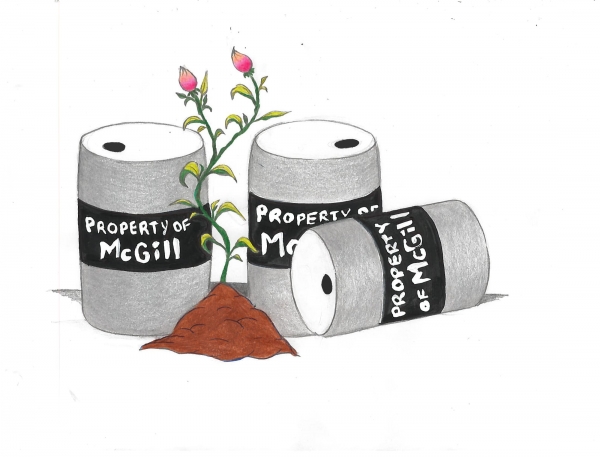On Sept. 23, the Post Graduate Students’ Society (PGSS) and their Environment Committee hosted an online discussion and panel titled “Divestment from Fossil Fuels at McGill.” The panel presented arguments in favour of McGill divesting from fossil fuels, examined what divestment might look like, and delved into the broader implications of divestment.
The three panelists at the event were Dr. Greg Mikkelson, a former professor at McGill who resigned in Jan. 2020 in response to the administration’s refusal to divest from fossil fuels, as well as Dr. Jen Gobby from Climate Justice Montreal, and Talia Martz-Oberlander of Divest McGill.
Martz-Oberlander, a graduate student in experimental physics, presented on behalf of Divest McGill. The organization was founded in 2012 and is composed of students, faculty, and staff at McGill who are calling for the university to withdraw their financial investments in fossil fuel corporations. Martz-Oberlander described Divest McGill’s goals and demands to the audience of 25 individuals.
“Divest McGill is solidarity-minded, aiming to support Indigenous land defenders,” Martz-Oberlander said. “[We want McGill to] withdraw direct holdings from the top 200 fossil fuel companies, as ranked by reserves of oil, coal, and natural gas. [We call for] immediate divestment from direct holdings in TC Energy, in solidarity with Wet’suwet’en peoples.”
Martz-Oberlander continued to highlight the impacts of McGill’s financial investments in the fossil fuel industry on its community.
“It’s not just that we have money invested,” Martz-Oberlander said. “This is someone’s home, this is someone’s access to their culture and their people, [threatened by companies] that we’re directly investing in.”
The panellists also criticized McGill’s decision to pursue “decarbonization” rather than divest from fossil fuels completely.
“The problem with decarbonization is that it directly supports the fossil fuel industry in shirking its responsibilities for climate change and the damage that they’re wreaking with the harms of its products and operations,” Martz-Oberlander said. “Suncor […] is invested at the most primary level in having fossil fuels be burnt, but under ‘decarbonization,’ McGill is still allowed to invest in them.”
Gobby spoke on behalf of Climate Justice Montreal (CJM), a grass-roots organization founded in 2009. CJM pursues climate justice and stands in solidarity with Indigenous communities through direct action and education. Gobby reiterated the importance of committing to taking meaningful action against climate change.
“Divestment is absolutely necessary at this scale and in these institutions if we are going to address climate change in any meaningful way,” Gobby said. “The kind of change necessary is unprecedented.”
Gobby also challenged the notion that investment is a passive enterprise, arguing that through decarbonization, McGill fails to adequately address the environmental impacts of the fossil fuel industry.
“What [the administration is] doing is making this statement that being invested in an industry that is killing people and putting the future of their students at risk [is] natural and inevitable, instead of seeing it as a social construct meant to benefit the ruling class,” Gobby said.
Along with Martz-Oberlander and Gobby, Mikkelson condemned McGill’s inaction, emphasizing that the administration has failed to fulfill their moral obligations.
“What should make all universities divest are […] moral, political, and financial arguments,” Mikkelson said. “It’s just deeply morally repugnant, morally outrageous, and morally unacceptable to claim credit for trying to reduce your own fossil fuel consumption, but at the same time bank on or otherwise promote the expansion of fossil fuel production.”
Speaking to the importance of immediate action, Mikkelson drew attention to the fact that climate change is already well under way.
“It’s happening, we’re in the thick of it,” Mikkelson said. “It’s only going to get worse unless we deeply transform what we’re doing, and deeply transform our society.”
Addressing the concept of decarbonization that Martz-Oberlander brought up earlier in the event, Mikkelson shared his thoughts on McGill’s decarbonization efforts.
“I think there’s nothing wrong with decarbonization, I just don’t think that what McGill is doing [is enough],” Mikkelson said. “Because, as [Martz-Oberlander] pointed out, according to the definition [of decarbonization] that McGill is using, they are only counting the greenhouse gas emissions created by a company in producing their product. But they are completely letting companies off the hook for what happens to their product afterwards.”









